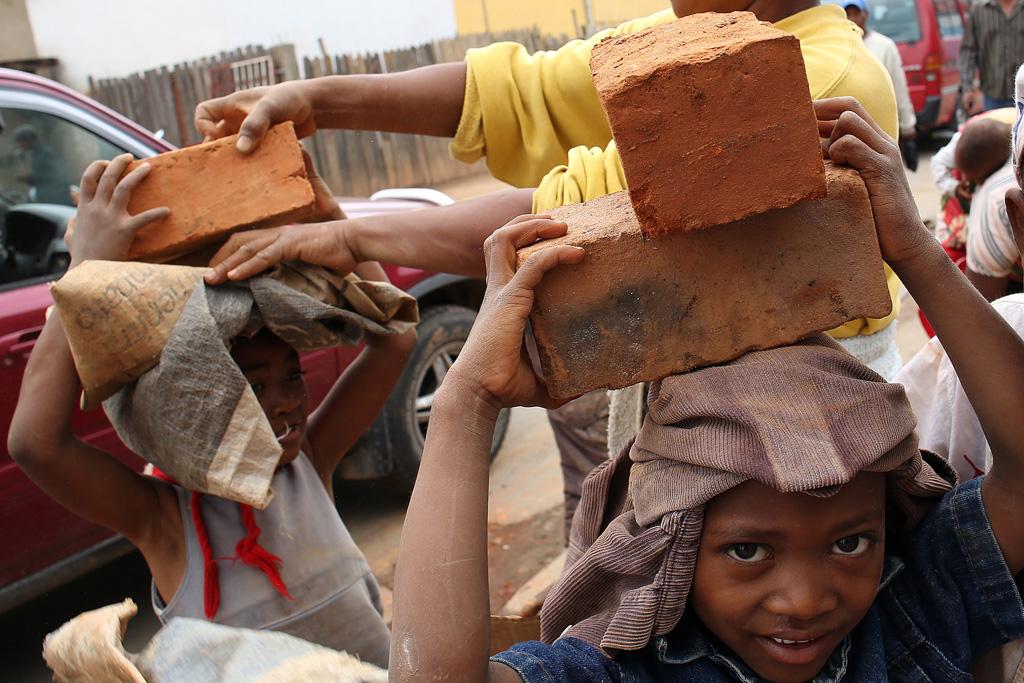Why Madagascar’s children have the most at stake in Friday’s presidential election
Children carry bricks on December 19, 2013 in Antananarivo, ahead of the upcoming presidential election.
ANTANANARIVO, Madagascar — As the east African island nation of Madagascar picks a president on Friday, five years after a coup d’état sent the country spiraling into crisis, the political dynamics will be closely scrutinized. Will there be post-election violence? How will the impasse between the toppled former president Marc Ravalomanana and his successor, Andry Rajoelina, resolve itself? Will the government shed its pariah status among the international community?
But those with the most at stake will play no role in the political intrigue. Amid unprecedented social and economic turmoil since the 2009 coup, Madagascar’s children have borne the highest costs.
“It’s what you would see in countries like DRC,” says Steve Lauwerier, the UNICEF country director. Except, he adds, “We didn’t have a war. There was no big economic crisis. There was no reason that this should happen.”
What has happened is a peacetime humanitarian collapse of startling proportions. While other African nations have progressed rapidly in health and education, Madagascar has stagnated or regressed. Half of children under 5 suffer from chronic malnourishment, or “stunting,” the fourth-highest rate in the world. At least 1.5 million children do not attend school — which the world bank estimates could be an increase of 600,000 since 2009.
The two candidates—one backed by the exiled Ravalomanana, the other by Rajoelina—have both vowed to put Madagascar’s house in order. International donors slashed foreign aid after the coup, which accounted at the time for 40 percent of the government’s budget.
In a bid to head off inflation and maintain international confidence, the government drastically cut spending on social services just as the economy — which had routinely registered 5 percent annual GDP growth —entered a tailspin. As of 2010, more than three-quarters of the population lives on less than a dollar a day, an 8 percent increase over 2005.
The consequences are evident on the capital Antananarivo’s congested streets. Children with absent gazes weakly rap on the windows of taxis stalled in traffic, pleading for a few cents. Others find employment as domestic workers in what the United Nations recently called “slavery-like conditions.” Still others work the streets at night in the country’s thriving sex industry.
According to UNICEF, one-third of Malagasy children between the ages of five and 14 are involved in economic activities.
Norotiana Jeannoda, who heads an advocacy organization for women and children in Antananarivo, says that the problem often starts at home. In the last five years, she has documented thousands of cases of children who have fled sexual, physical and psychological abuse. Rising poverty and unemployment have turned households into increasingly volatile places. Last year, she documented 1,300 runaways. Thirty-seven percent, she says, ended up in domestic labor; others have become prostitutes or hawk cheap merchandise on the street.
As more and more children illegally enter the workforce, the state has offered fewer protections. In the past five years, not a single person has been convicted in connection with child prostitution, even as cities like Antananarivo and the resort town of Nosy Be grow as hubs for sex tourism and other forms of child exploitation.
“You get a kind of lawlessness and extreme violations of child rights,” says Lauwerier. “For example, child prostitution is seen as something trivial. Nobody turns around in the streets when they see a kid of 10 years old on the sidewalk. People are not shocked by it.”
Free and fair elections should help. Increased humanitarian funding over the last two years—channeled through NGOs and community organizations—has stanched some of the worst bleeding, and foreign donors say they are prepared to reopen their coffers. But they caution that large-scale aid will take time to start flowing again.
The new president, meanwhile, will have an opportunity to refocus government priorities toward Madagascar’s most urgent problems.
Most Malagasy, however, don’t seem terribly optimistic. In a dark reference to recent outbreaks of bubonic plague in the country, one local newspaper described the election as “a choice between cholera and the plague.”
More from GlobalPost: Rats, locusts and hungry children: Can elections save Madagascar from the abyss?
Aaron Ross's travel in Madagascar was funded by a grant from the Pulitzer Center on Crisis Reporting.
The story you just read is accessible and free to all because thousands of listeners and readers contribute to our nonprofit newsroom. We go deep to bring you the human-centered international reporting that you know you can trust. To do this work and to do it well, we rely on the support of our listeners. If you appreciated our coverage this year, if there was a story that made you pause or a song that moved you, would you consider making a gift to sustain our work through 2024 and beyond?
